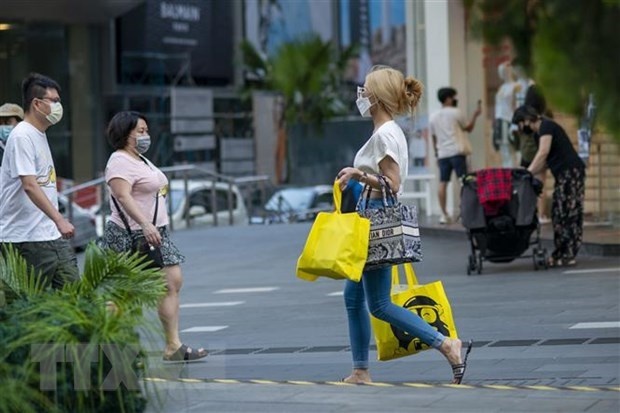Malaysia plans to fully reopen borders in March
 |
| Residents seen wearing masks while walking on a street in Kuala Lumpur, Malaysia. (Photo: XINHUA/VNA) |
Kuala Lumpur – Malaysia’s National Recovery Council (NRC) has agreed to fully open the country’s borders in March to support the country’s economic recovery.
NRC Chairman Muhyiddin Yassin told a press conference on February 8 that it agreed to the full opening of the borders as early as March 1 without the need for mandatory quarantine.
However, he said, those entering Malaysia would have to undergo COVID-19 tests before and right after arriving into the country as recommended by the Health Ministry.
The opening of borders needed to be done accordingly and based on current risk assessment, Muhyiddin said. He also expressed his confidence that the country's public health system can control the number of daily infections based on the past experiences.
In the context of the wave of Omicron variant that is strongly affecting Malaysia, causing the number of new COVID-19 infections daily to increase sharply to 5-digit levels, the Ministry of International Trade and Industry (MITI) reaffirmed that there will be no total lockdown of the economic and industrial sectors again.
Senior Minister Mohamed Azmin Ali said the previous closure of the economic sectors had a huge impact on the economy, especially on the people, causing 826,000 to lose their jobs in the first three months of 2020 when the government imposed a movement control order.
MITI will take a targeted approach by closing only the industries affected and focusing on getting the employees vaccinated, he said.
Currently, Malaysia’s borders are only opened to foreigners on a case-to-case basis such as emergencies, official business and other related matters.
The country also has had a quarantine-free vaccinated travel lane (VTL) arrangement with Singapore since November last year and a Langkawi international travel bubble.
Malaysia logged 13,944 new COVID-19 cases on February 8, raising the total number of infections to over 2.9 million, including 32,043 deaths. Almost 98 percent of adults in Malaysia have been fully vaccinated, while more than 53 percent of adults have received booster jabs.
What the stars mean:
★ Poor ★ ★ Promising ★★★ Good ★★★★ Very good ★★★★★ Exceptional
Related Contents
Latest News
More News
- France supports Vietnam’s growing role in international arena: French Ambassador (January 25, 2026 | 10:11)
- Foreign leaders extend congratulations to Party General Secretary To Lam (January 25, 2026 | 10:01)
- Russian President congratulates Vietnamese Party leader during phone talks (January 25, 2026 | 09:58)
- Worldwide congratulations underscore confidence in Vietnam’s 14th Party Congress (January 23, 2026 | 09:02)
- Political parties, organisations, int’l friends send congratulations to 14th National Party Congress (January 22, 2026 | 09:33)
- 14th National Party Congress: Japanese media highlight Vietnam’s growth targets (January 21, 2026 | 09:46)
- 14th National Party Congress: Driving force for Vietnam to continue renewal, innovation, breakthroughs (January 21, 2026 | 09:42)
- Vietnam remains spiritual support for progressive forces: Colombian party leader (January 21, 2026 | 08:00)
- Int'l media provides large coverage of 14th National Party Congress's first working day (January 20, 2026 | 09:09)
- Vietnamese firms win top honours at ASEAN Digital Awards (January 16, 2026 | 16:45)

 Tag:
Tag:




















 Mobile Version
Mobile Version